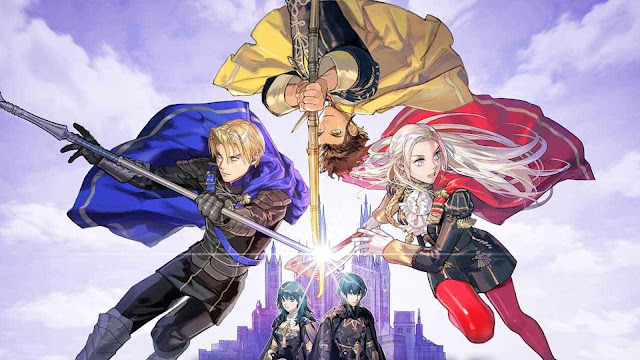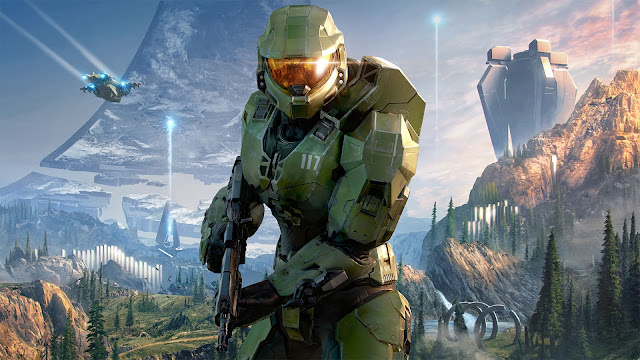Fire Emblem Three Houses' Unexpected Genealogy
I'm two months late but I beat one of the four routes of Fire Emblem: Three Houses on the Nintendo Switch. Overall I found it a great game with a good story, good characters, decent writing, great gameplay, and not wallowing in the waifu oversexualization/dating simulation that pained Fire Emblem Fates. But one thing I noticed is how much Intelligent Systems borrowed from a long forgotten Fire Emblem, a name that rarely reaches western ears due to its Japanese exclusivity; Fire Emblem: Genealogy of the Holy War. Which also leads me to question if we're gonna see the long forgotten 4th game get the Echoes treatment like Gaiden did in 2017. But in order to understand what I mean, we need to look at what is borrowed to understand.
Of course, the first and perhaps most important of these ideas is in story. Three Houses follows three heirs, Dimitri, Edelgard, and Claude; all at an officers academy for training. Of course in actuality you play a side character who I named the default of Byleth and who becomes professor to one of their three classes but this is the story of of those heirs not your OC, because they tried it with Fates and look how that turned out. Eventually shenanigans happen as shenanigans are won't to do which I won't go into because spoilers for a recent game and war breaks out between the three nations and and the game explores what it's like for childhood friends in academy to go to war against each other.
This is actually a developed version of a plotline from Genealogy where the main character, Sigurd, is stated to have made close friends in his Academy days with fellow aspiring knights, Quan and Eldigan. And just like with Claude, Dimitri, and Edelgard, war eventually tears the three apart, with Sigurd and Quan forced to face Eldigan on the field of battle. Quan siding with Sigurd due to his own loyalty and the fact that he married Sigurd's sister Ethlyn which gives him closer ties to Sigurd. And Eldigan fighting for the guy who tried to kill him and who's lackeys almost abducted his sister because... Eldigan is denser than pudding let's be real here. And in case you think I'm grasping for straws, Three House's director indicated that Sigurd, Eldigan, and Quan's story in Genealogy was the inspiration.
The other story element in Three Houses inspired by Genealogy is the time skip. Simply put things get all sort of fucked and Byleth winds up Rip Van Winkling it for five years and then the game's second half begins. And again another idea from Genealogy rears it's head as it too skipped time, though in a much different and darker way. In Three Houses Byleth fell down a ravine, hit his head, and didn't get up in the morning. In Genealogy Sigurd realizes too late that his friend Arvis framed Sigurd and his father, forced him on the run, trapped him in a canyon, and married Sigurd's wife for good measure. And then Sigurd is incinerated by Arvis as the game jumps 17 years and follows Seliph and the children of your army in the first half as they try to end the reign of Arvis' empire. So yeah, a lot more drastic than Three Houses.
 But it's not just story, it's also gameplay that Three Houses takes from Genealogy. In Three Houses you learn that some units have crests, inherited seals that grant them superior abilities and ownership of several sacred weapons which are best in class. Genealogy meanwhile has holy blood and sacred weapons, abilities and weapons linked to their blood and whoever inherits it is a battlefield asset. Of course the difference is that where crests give slight bonuses, holy blood turns your units into nuclear weapons so broken it's actually disgusting. Special shout out going to Lewyn and Forseti because that just destroys armies. Tough boss? Holy blood it, even if you don't win you'll still hurt them hard enough. Heck, even with out their holy weapons those units still hurt like tanks, something uncommon in Three Houses.
But it's not just story, it's also gameplay that Three Houses takes from Genealogy. In Three Houses you learn that some units have crests, inherited seals that grant them superior abilities and ownership of several sacred weapons which are best in class. Genealogy meanwhile has holy blood and sacred weapons, abilities and weapons linked to their blood and whoever inherits it is a battlefield asset. Of course the difference is that where crests give slight bonuses, holy blood turns your units into nuclear weapons so broken it's actually disgusting. Special shout out going to Lewyn and Forseti because that just destroys armies. Tough boss? Holy blood it, even if you don't win you'll still hurt them hard enough. Heck, even with out their holy weapons those units still hurt like tanks, something uncommon in Three Houses. And the final piece of the puzzle is canto movement, the ability for cavalry to move after doing an action. In most games it's rescuing units or trading items. In both Genealogy and Three Houses, you can do it after attacking, which makes cavalry a more formidable rapid strike unit. Get in, whack bad guy, and get back to your lines before the enemy can respond. And given how in Three Houses just how many Master Classes are on horseback it's a pretty big deal. Of course the difference is that in most FE's, even Three Houses, cavalry has a niche. In Genealogy cavalry stomp on everything, to the point where slow moving armored units are freaking useless and you just leave them at home base *coughArdencough*.
And the final piece of the puzzle is canto movement, the ability for cavalry to move after doing an action. In most games it's rescuing units or trading items. In both Genealogy and Three Houses, you can do it after attacking, which makes cavalry a more formidable rapid strike unit. Get in, whack bad guy, and get back to your lines before the enemy can respond. And given how in Three Houses just how many Master Classes are on horseback it's a pretty big deal. Of course the difference is that in most FE's, even Three Houses, cavalry has a niche. In Genealogy cavalry stomp on everything, to the point where slow moving armored units are freaking useless and you just leave them at home base *coughArdencough*.Of course Genealogy is much more unique than having it's DNA used in Three Houses, it's the Fire Emblem game with the most daunting maps in the series, easily three times the size of a normal FE map. It also introduced marriage as a mechanic for the good Awakening used it for and the ill Fates used it for. It gave us the weapon triangle as well, which has defined the series for decades. Genealogy does deserve a proper remake, if anything to fix the games pacing issues in gameplay. The world of Judgral deserves to be known by more as well, it's like gaming's answer to Westeros. But it's nice to know that there are some who remember the Holy War's of Judgral and at least try to honor them. Just uh, don't go to Belhalla, it won't end well.








Comments
Post a Comment